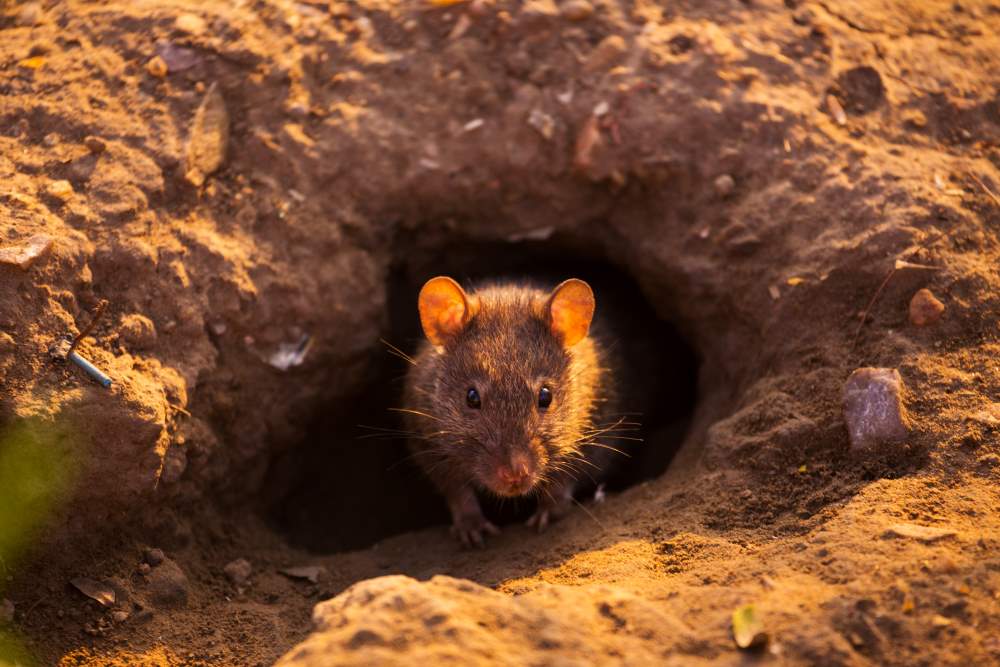
Updated April 15, 2025
Rat burrows are a common sight in many urban environments, but what exactly are they, and how do they impact our homes and gardens? This article delves into the details of rat burrows, revealing the inner workings of these intricate networks and providing practical advice on handling them.
The Basics of Rat Burrows: Do Rats Tunnel in the Ground?
Rat burrows are underground tunnels created by rats to provide shelter and a route for finding food. These tunnels are typically 2-4 inches in diameter and can extend up to 18 inches beneath the surface. They often have multiple entrances and exits for easy access and quick escape in case of danger.
Two main species of rats are known to burrow – the Norway rat (Rattus norvegicus) and the Roof rat (Rattus rattus). However, it’s the Norway rat that typically creates rat burrows in yards, while Roof rats prefer nesting in elevated locations such as trees or attics.
Rats are versatile creatures and can make their burrows in various environments. They usually prefer to burrow near food and water sources, like under bushes, near building foundations, or in garden areas. They may also burrow in sandy soil and areas that offer some form of concealment.
What Do Rat Burrows Look Like?

Detecting a rat burrow can be tricky, especially if you don’t know what to look for. Here are some characteristics of a typical rat burrow:
Surface Appearance
From the outside, a rat burrow appears as a small hole in the ground. The largest ones usually serve as the main entry points, while smaller ones act as additional entrances or exits. If the burrow is active, the main entrance is often cleared of vegetation.
Depth and Structure
Rat burrows usually extend 12-18 inches deep. However, if the burrow is located against a building’s foundation, it could go as deep as 4 feet, allowing rats to infiltrate the building.
Signs of Activity
Look for signs like runways (worn-down paths in the grass made by rats) or greasy track marks along walls that lead to the burrow entrance. Rat droppings may also be present along these paths.
If you’re still curious about what pest has burrowed into your yard, check out this article detailing the types of holes that may pop up around your property.
The Impact of Rat Burrows

These burrows can have several negative effects on your property and health.
Property Damage
Rats can cause structural damage by gnawing through wood and concrete to create their burrows. They can also damage electrical wires, leading to the risk of short-circuit fires.
Health Risks
Rats carry a host of diseases that can be harmful to humans. The presence of rat burrows increases the chances of transmitting these diseases to humans.
How to Handle Tunneling Rats

If you’ve discovered burrowing rats around your property, it’s essential to take immediate action to remove them.
Removing the Attraction
Before you can effectively deal with rat burrows, you need to remove the conditions that attracted the rats in the first place. This might involve removing clutter, trimming overgrown bushes, and eliminating potential food sources.
Sealing Up the Burrows
Once the attraction has been removed, the next step is to locate and seal off the rat burrows. This can be done by filling up the burrows and closing off the entrances.
Professional Help
If the burrow is active, it’s recommended to seek professional help. Pest control experts like Banner Pest Control have the necessary tools and expertise to handle active rat burrows safely and effectively. Give us a call at the first sign of a tough rodent infestation!
Destroying Rat Tunnels in Gardens
Rats are known to burrow in gardens due to the easy availability of food and water. Here’s how to handle rat burrows in a garden setting.
Installing Barriers
Installing sturdy wire mesh or chicken wire can help block rats from entering your garden. You can also place wire mesh below the soil around plants to prevent rats from digging.
Keep Your Lawn Clean
Keeping your garden clean and well-maintained can deter rats. This includes removing clutter and keeping compost in rodent-resistant bins.
Rat Tunnels and Home Foundations
Rats can dig holes near your home’s foundation, threatening its structural integrity. If you suspect that rats are burrowing near your home’s foundation, it’s important to take action immediately.
Rodent Control and Pest Control Professionals
If you’re dealing with a rat infestation, it’s always best to seek help from a professional pest control service like Banner Pest Control. We have the expertise and tools to effectively handle rat burrows and other pest-related issues.
In conclusion, rat burrows are a serious issue that needs to be addressed promptly. With the right information and professional help, you can effectively manage and eliminate rat burrows on your property.

